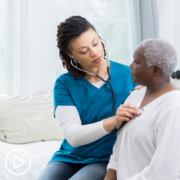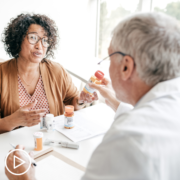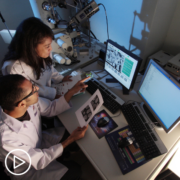Best Practices: Crafting Myeloma Clinical Trial Conversations to Individual Patient Needs
Best Practices: Crafting Myeloma Clinical Trial Conversations to Individual Patient Needs from Patient Empowerment Network on Vimeo.
What are some ways for myeloma nurses and care providers to optimize patient care? Advanced practice provider Charise Gleason shares her perspective on how care team members support patients and collaborate with physicians and research team members.
Download Resource Guide | Descargar guía de recursos
Related Resources:

|

|

|
Transcript:
Dr. Nicole Rochester:
So certainly, this conversation alludes to the fact that the clinical trials regarding these medications are also increasingly complex. And so I’m going to go to you, Ms. Gleason, because we know that nurses and advanced practice providers provide understanding of these trials, including potential benefits and risks, and all of the things that are required as they consider participating in a trial. And then, as you all have both shared, there is some tailoring around the treatment with regard to the disease state, whether it’s relapsing, whether it’s refractory. So with that in mind, do you have any best practices around tailoring the trial conversation with regard to specific patient needs and situations?
Charise Gleason:
Well, I’ll start with, we bring that discussion with all of our patients about the potential of a clinical trial from the start. And so we’re all versed on that, we all look to what clinical trial could be available for this patient. So we’re used to having that conversation. So our teams all need to be educated, participate in our research meetings, so we are ready to discuss a trial on that. We sometimes get to spend more time with patients, and we get to know our patients.
These are patients we see frequently, and so we can have those conversations. You might have somebody who’s starting to have a biochemical progression. It’s not time to change their therapy yet, but we’re already thinking about what’s that next line of therapy. And so as we start to approach that with clinical trials and standard of care, and opening that dialogue, so it’s really that communication and that rapport and relationship you have with your patient, and that care partner. So an ongoing conversation about the different treatments that are available to them.
Dr. Nicole Rochester:
So we know that patients with myeloma are living longer lives based on everything that you all have shared, and with that comes a different set of options and challenges. And you also have alluded to this team-based approach, Ms. Gleason, and we know that there’s a critical role that advanced practice providers play in the myeloma clinical trial setting. So I’d love for you to speak to that..the role that advanced practice providers play in myeloma clinical trials.
Charise Gleason:
Yeah, the advanced practice providers have started specializing like our physicians do, and we have that collaborative relationship, and we are part of that team approach to take care of our patients. So we’re identifying patients for potential clinical trials. Our scope of practice does vary a little bit from state to state. So in some cases, we can also enroll patients. If we’re not able to do that, though, we can already have discussed the trial, discussed side effects, presented them with the consent.
So when they do meet with the physician, they’ve already seen a lot of that information, and then they can ask further questions with the physician. I think the other big role that we play in the clinic setting is we see these patients, we see these patients for follow-up. So we’re doing a lot of management of the side effects, supportive care through the trials. We might be a little more available during the week, so if a patient’s here on another day, and they’ve got something going on, we’re answering those portal questions, and calling patients back and just really collaborating with our physicians and also the research team.










